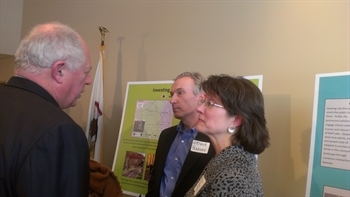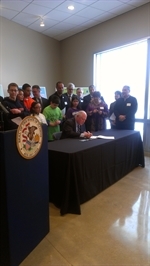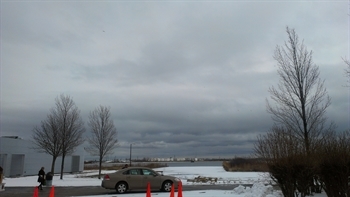
Photos by Abby Crisostomo
The newly appointed Millennium Reserve Steering Committee
More than a year after its launch, Illinois’ Millennium Reserve initiative is getting a bit of a reboot. On March 1, Gov. Pat Quinn and the Ill. Dept. of Natural Resources issued an Executive Order establishing a steering committee to serve as the central governing body to lead the vision for the reserve. The steering committee is charged with developing goals, objectives and priorities; providing direction for short- and long-term plans; identifying projects of regional significance and recommending major policy initiatives; identifying resources; and engaging with counterparts in Indiana. MPC President MarySue Barrett was appointed to the steering committee, which will help refocus the environmental restoration and economic redevelopment goals of the initiative to make some real progress through subregional coordination.
The Millennium Reserve initiative will benefit from an analysis by the steering committee on just how well-positioned the Calumet region is to strategically undertake catalytic projects. This means not only selecting and funding priority projects, such as the Ford Environmental Center, but also assessing whether and how the region can strategically build momentum for environmentally sensitive, but economically ambitious redevelopment.

Gov. Patrick Quinn talks with MPC President MarySue Barrett and Arthur Pearson from the Donnelly Foundation about the Millennium Reserve.
We’re big fans of regional collaboration at MPC, not only because natural resources and the economy don’t follow political boundaries, but also because, especially in an era of declining fiscal support from the federal and state governments, communities do better at accomplishing goals if they work with, rather than compete against, each other. The question throughout northeastern Illinois, is whether existing institutions have enough capacity to move past planning to implement regional development goals, while efficiently collaborating with stakeholders.
In some cases, communities are able to self-organize to work together toward mutual goals. For example the Northwest Water Planning Alliance is a group of roughly 80 communities working toward sustainable groundwater use in the northwest suburbs, and the West Cook County Housing Collaborative is five suburbs working to connect affordable housing and transportation. But in other cases, a new entity with its own financing and legal authorities is created to focus on one goal, such as the recently established Cook County Land Bank to strategically manage vacant and foreclosed properties, or the Northwest Indiana Regional Development Authority to coordinate the Gary region’s reinvestment strategy.
In the Chicago region, we have several plans to achieve sustainable economic growth, primarily the Chicago Metropolitan Agency for Planning’s (CMAP) GO TO 2040 comprehensive plan for the seven counties and 284 communities in the Chicago region.
We have the plan, but how do we as a region strategically coordinate its implementation? CMAP provides local technical assistance to communities and organizations that implement projects that align with GO TO 2040, but what about catalytic projects that cross borders and require coordination of multiple levels of government? Other regional plans and recommendations also exist, such as World Business Chicago’s (WBC) Plan for Economic Growth & Jobs, but neither CMAP nor WBC can raise revenue, nor does either have the legal authority to implement many of the recommendations in their plans.
This gap between planning and implementation is specifically called out in Gov. Quinn's Executive Order on the Millennium Reserve. The order underscores a critically important question facing our region:
Would better coordination of Illinois’ existing development agencies and their many financing tools do more to advance the transformative projects that spur sustainable and regional economic growth? Or do we need to empower a more centralized development agency, such as CMAP, to implement our region’s plan?
With support from the MacArthur Foundation, MPC has set off to answer just that question.

Governor Quinn signs the Executive Order to put in place a steering committee for the Millennium Reserve.
According to GO TO 2040, more than 1,200 units of government collect revenues and provide services throughout northeastern Illinois. MPC is working first to get a sense of the scale of the challenges and opportunities of these entities by cataloging the various types of state, regional and local government units that influence development in the region and the financing and legal authorities they have. By understanding what financing tools (bonding, taxing, etc.) and legal authorities (eminent domain, land banking, etc.) these existing entities have, we can get a better picture of what the region is capable of doing. For example, the Illinois Finance Authority is an agency that can provide low-cost financing for both public and private institutions, recently working with the Ill. Environmental Protection Agency to fund the $1billion Clean Water Initiative.
MPC will then use our extensive experience bringing together government, private sector, nonprofit, and community development partners to test how these various entities and their financing and legal tools can effectively collaborate to realize the high-priority recommendations set forth by existing plans. Like the National League of Cities’ framework for regional problem solving, we will use specific examples from the Calumet region to assess whether and how the region can implement transformative investments to spur sensible development, either by creating a new entity, empowering an existing one, consolidating existing agencies, establishing frameworks for improved collaboration, or some combination of the above.
By outlining cross-cutting goals and outcomes, the obstacles to completion, and the appropriate entities with the necessary financial and legal authorities to make them happen, MPC will create a roadmap for strategic implementation of transformative projects for a more livable and prosperous region. The Millennium Reserve with its new steering committee provides a great forum in which to begin.

William W. Powers State Recreation Area, site of Governor Quinn's Mar. 1 signing of an Executive Order appointing a steering committee for the Millennium Reserve.